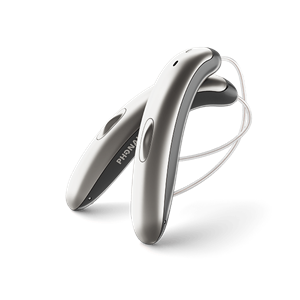Age-related hearing loss

Age-related hearing loss
15 min.
Publication Date: August 22, 2019
Aging is a natural part of life. For many people, aging might also come with a decline in their ability to hear. Age-related hearing loss is very common, and it can come on very gradually. If you suspect you may be experiencing some form of hearing loss, it’s important to understand the warning signs, and learn what you can do to be on top of it. Keep reading to learn more.
Age-related hearing impairment, also known as presbycusis, is a decrease in hearing ability that happens as you get older. It is the most common type of sensorineural hearing loss. The term, sensorineural loss of hearing means that you have damage to the hair cells in your inner ear or to your nerve pathways. In the majority of the cases, hearing loss affects both of your ears.
You may find it surprising to learn that age-related hearing loss can begin at a relatively young age. Your hearing can start declining as early as in your thirties and forties and continue deteriorating over time. Although presbycusis is not life-threatening, leaving it untreated is not a good idea. As the condition worsens, it will take a toll on your quality of life.
At the early stages of presbycusis, you may find it difficult to hear high-frequency sounds. Speech falls into this category, which means that understanding spoken words will become more challenging as time goes on. Hearing others gets even harder in environments with loud noise or with a ton of background noise. The tricky aspect of presbycusis is that since the hearing loss happens slowly, so you may not even realize that you can't hear as well as before.
Over time, as your hearing loss continues to worsen, you will find that high-pitch sounds are not the only ones giving you trouble. You will notice that presbycusis now affects other frequencies as well. Discovering where a sound is coming from and recognizing its source, become more difficult. You may also experience tinnitus (ringing in the ears), dizziness, and even problems with your balance.
Age-related hearing loss can slowly take a toll on your quality of life. Often, when people realize the extent of their hearing loss, they become extremely discouraged and more reluctant to participate in social interactions. Social isolation and depression are common consequences of hearing troubles. If you struggle with presbycusis, you may be able to relate to this emotional turmoil that goes on. It is not easy to face the reality of not being able to hear and understand when others speak to you.
Another concern is that your worsening hearing loss can quickly turn into a safety issue. Can you imagine not hearing the high-pitch sound of a smoke alarm when your house catches on fire? Or not hearing the siren of the ambulance as you drive on the highway? All these situations can put you in harm's way. If you experience age-related hearing loss, it's important to get your hearing tested. Once the extent of your hearing loss has been determined, you can work with a hearing care professional to find the best hearing solution for your individual needs. If necessary, he or she may recommend a hearing aid to help improve your hearing and give your self-esteem back.
What causes age-related hearing loss?
Even though it may be tempting to blame your declining hearing ability on aging alone, there is more to the equation than that. Although scientists do not entirely understand the exact causes of the condition, many factors are likely to contribute to the hearing loss we encounter as we age. They aren't sure if the problem is in the inner ear, middle ear or in the outer ear.
Doctors believe that presbycusis is caused by a combination of environmental, genetic, and lifestyle factors. Many experts associate the development of age-related hearing loss with changes in the inner ear. In the inner ear is where sound waves are converted to nerve impulses.
If you think that your hearing has gradually gotten worse over the years, the best thing to do is to get your hearing checked. You can do that by making an appointment to see a hearing health professional, such as an audiologist. if you are unable to see your hearing care professional in person at this time, test your hearing with our Online Hearing Test.
Based on your hearing test results, your audiologist will be able to determine the extent of the damage in each ear. Your hearing professional can work with you to recommend the best treatment options for you. Hearing aids have been used with great success as a solution for age-associated hearing loss. You will be able to ask questions about the various options and discuss the benefits of getting a hearing device.



